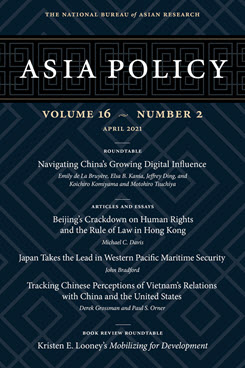China’s Drive for Innovation within a World of Profound Changes
This essay examines China’s drive for innovation as part of its national development strategy and addresses the tensions China faces between retaining control and autonomy in relevant sciences and technologies and becoming a global leader in these fields.
EXECUTIVE SUMMARY
MAIN ARGUMENT
The Chinese Communist Party (CCP) has assessed that the world is undergoing “profound changes unseen in a century” in part as a result of rapid advances in science and technology. The Covid-19 pandemic has heightened the impact of these changes and added to the disruption of the current global order. Such conditions present unique challenges and opportunities for China in the course of its national rejuvenation. Xi Jinping has accelerated the pursuit of China’s rise as a great power, and the 14th Five-Year Plan highlights the country’s capacity for innovation and to leverage science and technology in pursuit of that objective. Progress toward this goal, however, has been uneven. Although China aspires to be a new “high ground” in science and technology, the capacity for innovative Chinese technologies to go global may be undermined by a deficit of trust and transparency. If China does emerge as a leader in new frontiers of innovation in the course of the fourth industrial revolution, this shift could present significant implications for the future balance of power.
POLICY IMPLICATIONS
- China’s drive for innovation will continue to confront certain incongruities. While the CCP has prioritized innovation, the imperative of party control may undermine the necessary conditions for it. And while China has risen within and benefited from a world of open science, intense competition in the geopolitical environment is complicating that paradigm.
- China and its technology companies have shown increasing technological prowess (e.g., in coping with the Covid-19 pandemic) but still face technical impediments to overcoming strangleholds in key areas, such as semiconductors, that act as chokepoints.
- For the U.S. to sustain its traditional leadership in science and technology, it will need to revitalize and reinvest in innovation domestically.
Elsa B. Kania is an Adjunct Senior Fellow with the Technology and National Security Program at the Center for a New American Security (United States). Her research focuses on U.S.-China relations, China’s military strategy, defense innovation, and emerging technologies. She also works in support of the U.S. Air Force’s China Aerospace Studies Institute through its Associates Program, and she is a Non-resident Fellow with the Australian Strategic Policy Institute’s International Cyber Policy Centre. Her book Fighting to Innovate is forthcoming with the Naval Institute Press.
About Asia Policy
Asia Policy is a peer-reviewed scholarly journal presenting policy-relevant academic research on the Asia-Pacific that draws clear and concise conclusions useful to today’s policymakers. Asia Policy is published quarterly in January, April, July, and October and accepts submissions on a rolling basis. Learn more


